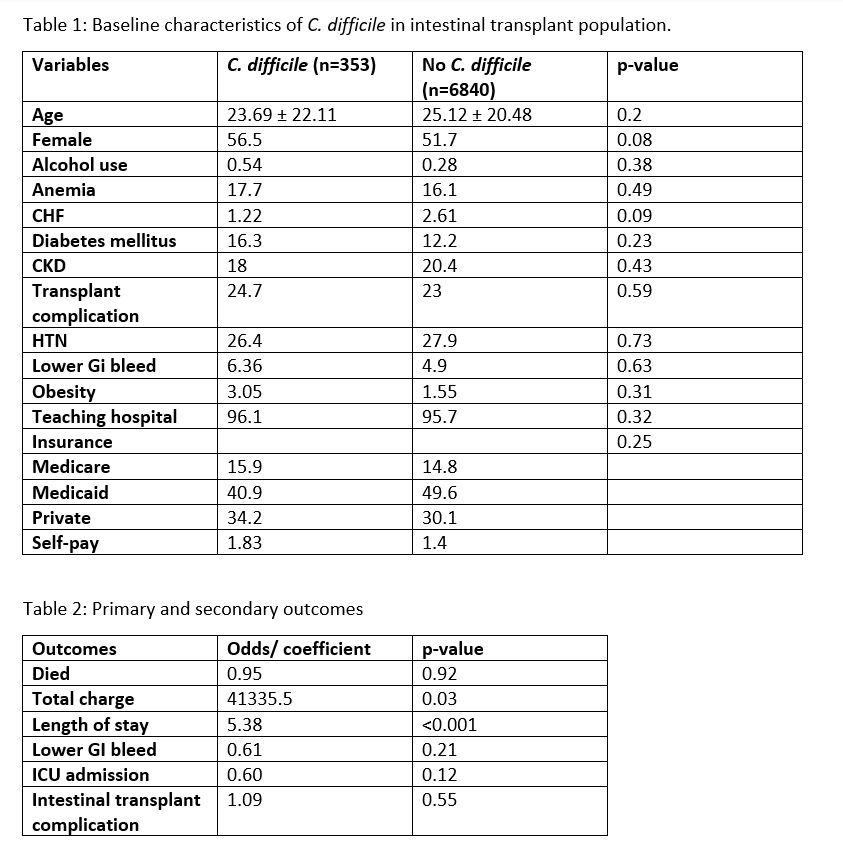The Outcome of Clostridioides Difficile Infection in Hospitalized Intestinal Transplant Recipients
1Clinical Investigation, Harvard Medical School, Boston, MA, 2Intestinal and Liver Transplantation, Mount Sinai Medical Center, New York, NY, 3Internal Medicine, Saint Joseph's Medical Center, Stockton, CA, 4Small Intestine and Liver Transplant, Duke University School of Medicine, Durham, NC, 5Gastroenterology and Hepatology, Henry Ford Health System, Detroit, MI
Meeting: 2022 American Transplant Congress
Abstract number: 343
Keywords: Infection, Intestinal transplantation
Topic: Clinical Science » Small Bowel » 66 - Intestinal Transplantation and Rehabilitation
Session Information
Session Name: Intestinal Transplantation and Rehabilitation
Session Type: Rapid Fire Oral Abstract
Date: Monday, June 6, 2022
Session Time: 5:30pm-7:00pm
 Presentation Time: 5:40pm-5:50pm
Presentation Time: 5:40pm-5:50pm
Location: Hynes Room 206
*Purpose: Organ transplantation is a known risk factor of Clostridioides difficile infection. There is limited published data on the frequency and impact of CDI in intestinal transplant recipients. Our aim is to determine inpatient outcomes of intestinal transplant patients with CDI.
*Methods: We utilized the National readmission data (2010-2017) to study the outcomes of C. difficile in patients having a history of undergoing intestinal transplantation. The association of CDI with hospital source utilization was computed in a multivariable model adjusted for age, sex, hypertension, diabetes, presence of congestive heart failure, obesity, chronic kidney disease, alcohol use, teaching hospital status and insurance type.
*Results: During 2010 – 2017, 7193 hospitalizations occurred in intestinal transplant recipients. Of these, 353 (4.9%) had C. difficile infection. The mean age of CDI patients was 23.69 ± 22.11 years and 56.5% were female. The CDI in intestine transplant recipients was associated with a higher median cost $ 57261.5 (IQR: $26753.5, $127178.5) as compared to patients who did not have CDI $44915(IQR: $21512, $104982) p=0.03. The median length of stay was also longer for patients having C. difficile 7(IQR: 4,14) days vs. 5 (IQR: 3,11) days (p<0.001). The mortality rate and frequency of lower gastrointestinal bleeding, intestinal transplant related complications and ICU admission rates were similar in both groups. We identified a total of 390 intestinal transplant done between 2010-2017 and the hospital admission rate for CDI among these patients was 3.6%.
*Conclusions: C. difficile infection does occur in post intestine transplant patients and is associated with longer length of stay and higher hospital costs.
To cite this abstract in AMA style:
Amjad W, Schiano T, Malik A, Segovia M, Jafri S. The Outcome of Clostridioides Difficile Infection in Hospitalized Intestinal Transplant Recipients [abstract]. Am J Transplant. 2022; 22 (suppl 3). https://atcmeetingabstracts.com/abstract/the-outcome-of-clostridioides-difficile-infection-in-hospitalized-intestinal-transplant-recipients/. Accessed February 26, 2026.« Back to 2022 American Transplant Congress

